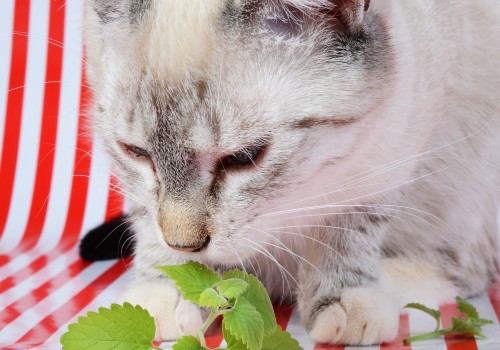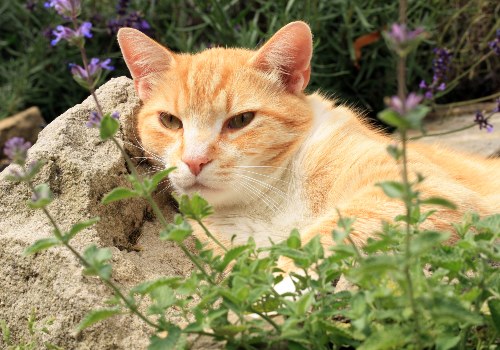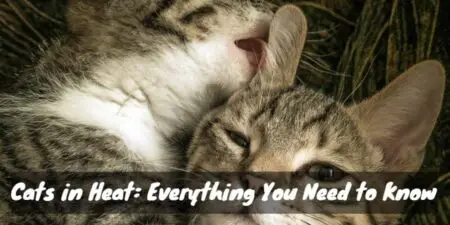Your cat may be the most prim and proper feline in the neighborhood, but give her a pinch of catnip and she won’t be able to stop her wild side from showing. Why does catnip make cats go crazy — and what, exactly, does it do?
Well, as with all mind-altering substances, the answer is both fascinating and highly variable depending on the individual cat. Hold on tight — it’s going to be quite the trip!
What Is Catnip?
Catnip’s scientific name is Nepeta cataria. “Nepeta” refers to Nepete, an ancient city in modern-day Italy where the plant was commonly found, while “cataria” is derived from “catus,” the Latin word for cat.
Technically a type of mint, catnip is a leafy plant with hardy stems and small clusters of white and purple flowers. But the real magic happens inside the plant, which contains an essential oil known as nepetalactone.
What Is Nepetalactone?

Nepetalactone is the substance that’s responsible for the wild behavior that cats exhibit after eating or smelling catnip. It stimulates certain receptors in the brain that create feelings of euphoria, relaxation and playfulness.
Most animals aren’t affected by nepetalactone, but when it comes into contact with a cat’s nasal tissue, it’s only a matter of seconds before the magic happens.
The molecules in the oil bind to protein receptors and send the emotional centers of the brain into hyperdrive. These emotional responses are then processed in the same way that feline pheromones are, which is why cats who sniff catnip often behave like female cats in heat.
Essentially, nepetalactone acts like sexual pheromones, and it’s no secret that sexual urges can drive cats up the wall. But unlike feline estrus, the effects of nepetalactone usually wear off after around 10 minutes, lasting an hour at most.
After the “high” ends, cats won’t respond to catnip again for anywhere from 30 minutes to 2 hours. The receptors need time to reset before the nepetalactone can bind to them again.
Do All Cats Respond to Catnip?
Genetics play a huge role in the way the brain responds to psychoactive substances. Just as medications and drugs don’t work on all humans, catnip doesn’t work on all cats.
In fact, 50% of adult cats exhibit no response to nepetalactone. Sensitivity is hereditary: cats whose parents don’t respond to catnip are much less likely to respond to it themselves.
And kittens don’t respond to catnip until they’re between 3 and 6 months old — around the same time they reach sexual maturity. This makes sense, considering that catnip’s effects are so similar to the effects of sexual pheromones.
How Do Cats React to Catnip?

Cat behaviorists have compared the effects of catnip on cats to those of marijuana or LSD on humans. But as with those and many other psychoactive substances, the actual effects depend on the method of ingestion.
What Happens When Cats Smell Catnip?
The strongest catnip effects occur when the nepetalactone is absorbed through the nasal tissue. All your cat needs to do is take a whiff and he’ll be soaring in a matter of seconds.
Cats who sniff catnip will seem to lose control of their bodies. They’ll roll around, flop on the floor, rub on things uncontrollably and generally move as much and as fast as they can.
Many cats also vocalize uncontrollably while under the influence of catnip. They meow, purr, growl and make strange, indescribable noises — often simultaneously!
What Happens When Cats Eat Catnip?
Some cats seem to prefer the taste of catnip to the smell of it. When presented with it, they’ll lick it up lickety-split — and promptly zone out.
When ingested and absorbed through the stomach, catnip has the opposite effect that it has when smelled. It sedates the cat, allowing it to enter a mellow, anxiety-free state.
Cats who eat catnip may move more slowly than normal, or they may simply collapse on the floor in a blissful, motionless state. They may seem disoriented, confused or spaced-out, but in a way that suggests they’re enjoying it nonetheless!
What Happens When Cats Rub on Catnip?
But some cats seem to prefer rubbing catnip to smelling or ingesting it. Put a little pile on the floor and your cat will flop down on top of it, rubbing his forehead and cheeks on it and generally making a huge mess.
This isn’t as nonsensical as it seems — in fact, it’s actually quite clever! By rubbing the catnip, the cat is crushing it and releasing more of the nepetalactone, similar to the way many herbs release more oils and aromas when crushed.
With the nepetalactone now freed from the leaves, the cat doesn’t need to sniff or eat it. It’s already in the air around him, and the effects will kick in even stronger and faster than they usually would.
"In ancient times cats were worshipped as gods; they have not forgotten this."
-- Terry Pratchett






I will never again alter my cats mind. I love my cat for his own mind. Seems abusive thaf this is widely accepted.
Isnt it like giving drugs or alcohol to a child?